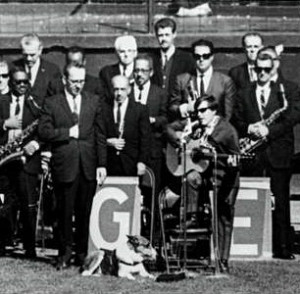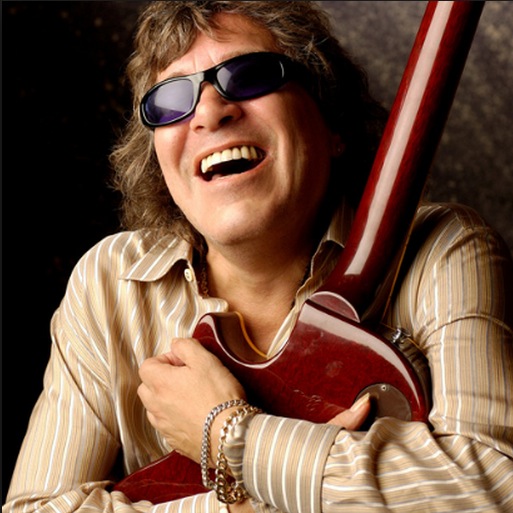 The blind singer, with guitar in hand and his guide dog Trudy by his side, faced a crowd of 54,000 people on October 8, 1968, and turned out what I consider one of the most moving renditions of our National Anthem ever performed. His delivery, with it’s unusual pacing and slow, stylized approach, stunned those in the stands and offended many of the millions watching the game on live TV. Viewers jammed the network’s phone lines with angry calls. World War II veterans were rumored to have thrown shoes at their television sets. Radio DJs vowed to never again play his records. Outraged patriots began demanding that this American CITIZEN, who had lived in New York City since the age of 5, be “deported.” (Puerto Rico is a U.S. territory; its residents ARE citizens!) Here’s how José explained it:
The blind singer, with guitar in hand and his guide dog Trudy by his side, faced a crowd of 54,000 people on October 8, 1968, and turned out what I consider one of the most moving renditions of our National Anthem ever performed. His delivery, with it’s unusual pacing and slow, stylized approach, stunned those in the stands and offended many of the millions watching the game on live TV. Viewers jammed the network’s phone lines with angry calls. World War II veterans were rumored to have thrown shoes at their television sets. Radio DJs vowed to never again play his records. Outraged patriots began demanding that this American CITIZEN, who had lived in New York City since the age of 5, be “deported.” (Puerto Rico is a U.S. territory; its residents ARE citizens!) Here’s how José explained it:
I had set out to sing an anthem of gratitude to a country that had given me a chance; that had allowed me, a blind kid from Puerto Rico — a kid with a dream — to reach far above my own limitations. I wanted to sing an anthem of praise to a country that had given my family and me a better life than we had had before.
I played it slowly and meaningfully, feeling the vastness of the stadium and the presence of so many people. But before I had finished my performance I could feel the discontent within the waves of cheers and applause that spurred on the first pitch — though I didn’t know what it was about.
With all the horrible things going on in America in 1968 – the assassinations of both Martin Luther King and Bobby Kennedy, the escalation of the war in Vietnam, the protests at the Democratic National Convention — it’s hard to believe that a man singing a beautiful, albeit, radically different version of a national anthem could create such outrage. José feared the performance would end his career.
 Yet, when he released his rendition of the anthem as a single later that year, it reached #50 on the Billboard charts. He went on to prove himself a vital artist, scoring many movie and TV soundtracks, acting in numerous films and television shows, performing as a guest on countless rock, jazz and Latin albums; and singing duets with artists like Natalie Cole, Gloria Estefan, and Paul Simon.
Yet, when he released his rendition of the anthem as a single later that year, it reached #50 on the Billboard charts. He went on to prove himself a vital artist, scoring many movie and TV soundtracks, acting in numerous films and television shows, performing as a guest on countless rock, jazz and Latin albums; and singing duets with artists like Natalie Cole, Gloria Estefan, and Paul Simon.
Since debuting in the coffeehouses of Greenwich Village in 1963, José, now 70, has won 9 Grammy Awards. He’s released more than 60 English- and Spanish-language singles that charted internationally, and more than 50 albums. In 1995, The City of New York renamed Public School 155 “The José Feliciano Performing Arts School.”
So, if all you know about Mr. Feliciano is his recording of the Christmas classic “Feliz Navidad,” please remember that his artistic expression once served as a very real example of what it means to be brave — in the land of the free.
Here’s a rare clip of José performing his gorgeous version of “The Star Spangled Banner” at the 1968 World Series. Nowadays, it’s common for performers to sing their own stylized versions of the song. But few are as moving as this.
© Dana Spiardi, Oct 20, 2014
]]>